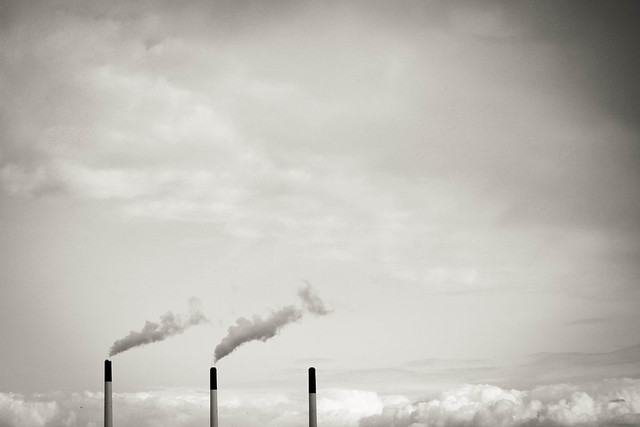Search Results for Tag: wind power
Climate Change: The longer we wait the more expensive it will get.

The Potsdam Institute for Climate Impact Research (PIK) recently released a new study that offers two different and probably controversial results. At first the researches say that everything is going to be extremely expensive the longer we wait until political leaders get active. „Global economic growth would be cut back by up to 7 percent within the first decade after climate policy implementation if the current international stalemate is continued until 2030“, the paper says. That‘s an awful lot compared to the 2 percent that are expected if there‘s a climate agreement reached by 2015.
The researchers conclude that it is most relevant to not further postpone mitigation to keep climate targets (the 2 degrees above pre-industrial levels-target e.g.) in reach. “Economists tend to look at how things balance out in the long-term, but decision-makers understandably worry about additional burdens for the people and businesses they are responsible for right now. So increased short-term costs due to delaying climate policy might deter decision-makers from starting the transformation. The initial costs of climate policies thus can be more relevant than the total costs”, lead-author Gunnar Luderer says.
On the other hand Ottmar Edenhofer, he’s the co-author of the study and chief-economist of PIK, formulates a goal that could make it possible to keep the earth’s rising temperatures below the 2 degrees-target mentioned above. But his demands seem to be quite optimistic. At first, he said, a wordwide carbon trading system must reach prices for CO2 emission rights of 20 to 50 Euro (27 to 67 Dollar) per ton. That would be the only way to increase the price of fossil energy sources at a level that could force the industries to switch over to green energy alternatives. Here we should keep in mind that a ton of CO2 is currently traded at just about 3 Euro (4 Dollar) in Europe.
According to Edenhofer especially technologies for carbon dioxide removal from the atmosphere might be required in the future to reach the climate targets. This implies the use of bio-energy alongside wind or solar power, with plants consuming CO2, combined with carbon capture storage (CCS), storing underground the emissions from biomass combustion. The longer it takes to start climate policies the higher is the world’s reliance on these technologies will be, the study adds.
For the study the scientists produced 285 alternative climate change mitigation scenarios, with varying assumptions on the course of international climate negotiations on the one hand and on the other hand the availability of low carbon technologies from solar and wind power to bio-energy, CCS and energy efficiency. For the economic evaluation, they considered indicators like mitigation costs, energy prices or potential financial transfers induced by an international carbon market.
Wind power crucial for fighting climate change
 As the parties are battling over ways to fight climate change in Durban at COP17, the Global Wind Energy Council published a new study on the potential of wind power for significantly reduce CO2 emissions in the energy sector. Since 40% of global CO2 emissions are produced by the power sector it is perfectly clear that we can not win the fight against climate change without a dramatic shift in the way we produce and consume electricity. As science makes clear: global emissions need to peak and begin to decline before 2020. That is a goal only to be reached with a increase of in renewable energy deployments. While building a conventional power plant can take up to ten years, a large wind farm can be put up in a matter of months. And within three to six months of operations, a wind turbine has offset all emissions from its construction, to run virtually carbon free for the remainder of its 20 year lifetime, according to the study.
As the parties are battling over ways to fight climate change in Durban at COP17, the Global Wind Energy Council published a new study on the potential of wind power for significantly reduce CO2 emissions in the energy sector. Since 40% of global CO2 emissions are produced by the power sector it is perfectly clear that we can not win the fight against climate change without a dramatic shift in the way we produce and consume electricity. As science makes clear: global emissions need to peak and begin to decline before 2020. That is a goal only to be reached with a increase of in renewable energy deployments. While building a conventional power plant can take up to ten years, a large wind farm can be put up in a matter of months. And within three to six months of operations, a wind turbine has offset all emissions from its construction, to run virtually carbon free for the remainder of its 20 year lifetime, according to the study.
In the latest publication concerning “Wind Energy and climate policy” introduced here in Durban it says that in terms of the targets already stated by the industrialized countries for the period up to 2020, global wind energy could contribute at least 44% of the total emissions reductions, i.e. 1.5 billion tons of CO2 every year. And although that is nowhere near what the science tells us is required, even for a larger reduction wind power could play a crucial role in achieving that goal.
As Nelson Mandela said: “It always seems impossible, until it is done.”
Japan Turning to Renewables

Energy in Japan has become a very important issues since the nuclear crisis at Fukushima began. Japanese Prime Minister Naoto Kan said on Tuesday that the country will now shift its energy focus away from nuclear power and towards renewable sources. Currently, Japan’s energy plan sees the country getting 50% of its electricity from nuclear power and about 20% from renewable by the year 2030. But Kan said that’s what he wants to change, especially in light of Fukushima, and wind power will play a big role.
Japan will start supporting biomass and solar power, too. Plus, Japan is home to tons of hot springs, and they represent enormous untapped potential for geothermal energy. In fact, Japan could even produce enough geothermal power to export to other countries in Asia.
We know Japan has gone back to the drawing board since the Fukushima crisis, and Germany, too, is reexamining its commitment to nuclear power. Do you think we’ll see this trend in other parts of the world too? Or is nuclear power too entrenched into the energy system where you live?
Wind energy – the soft power
Among renewable energies wind power is number one. Wind energy facilities are cheaper to set up and maintain, require less infrastructure and generate greater returns in the long run. Wind power has become a booming global industry with new and ever larger wind farms springing up everywhere. Large scale facilities in particular are supposed to be crucial for a global switch to renewables. Over the last three years alone the number of wind turbines across the world has more than doubled. The GLOBAL IDEAS reporters have visited China, India, Morocco and Germany to investigate the promises ? and challenges ? of wind power.
New grid to focus on wind power
Germany and nine other countries agreed to advance the development of an electricity grid in the North Sea to focus on the growing number of offshore wind farms in the region. Together with the EU Energy Commissioner Günther Oettinger the countries declared their cooperation in Brussels, as the Federal Economics Ministry announced in Berlin. At issue is the economic, technical and regulatory coordination.





Feedback